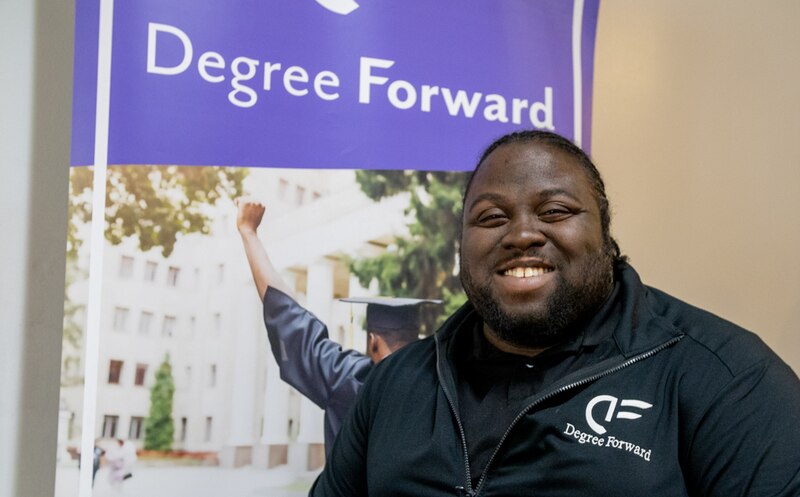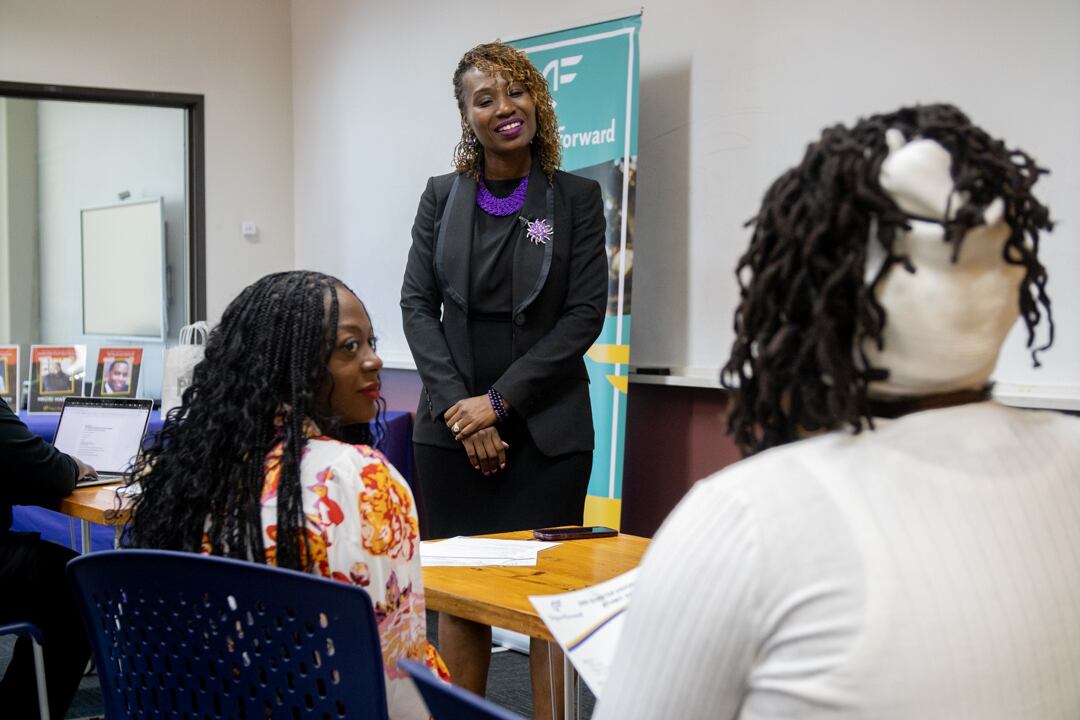Andrew Linton’s college journey has been more than 10 years in the making.
After high school, the native Detroiter went off to Virginia to attend Hampton University, but left school due to a family emergency. Linton then spent time working in Washington D.C. before he returned to Detroit in 2021 and refocused on his education.
“I always wanted to go back to school. I just didn’t come across the right program,” he said. “But the stars aligned. I just made it my main focus to finish my degree and further my academic and job opportunities.”
Three years later, the 34-year-old received his bachelor’s degree in health care management, thanks to Degree Forward, a Detroit college program geared toward individuals with full-time jobs or family responsibilities that don’t allow for traditional schooling.
Degree Forward partners with Southern New Hampshire University to provide students with affordable, accelerated online classes to earn an associate or bachelor’s degree. Anyone in Michigan can enroll in the program, and Degree Forward has hubs in Detroit and Huron County.
But, “one-on-one coaching is really the core foundation of the program,” said Degree Forward CEO Danielle North, noting the nonprofit’s academic coaches walk students through financial aid options and assistance with their assignments.
Students can choose from three areas of study: health care management, business management, and communications. And unlike traditional colleges and universities, the curriculum is project-based, meaning there’s no lectures, tests, or grades, North said.
“You can’t fail in this format because you receive a ‘not yet’ or a ‘master,’ she said. “You get an opportunity to get in a feedback loop of constantly resubmitting until you actually hit mastery.”
Rather than dividing the school year into semesters, Degree Forward has several terms throughout the year, with the next starting in June. Tuition is $2,332 per term before financial aid, with no books or extra fees, according to its website.
To attend, prospective students can submit an enrollment interest form on the Degree Forward website and get connected with a coach. Then they must fill out a degree program application for Southern New Hampshire University. Once the application is submitted, an academic coach will walk through the financial aid process or set up a payment plan, as well as any paperwork requested by the college. The only eligibility requirement for Degree Forward is a high school diploma or GED diploma.
For Linton, the program’s first Black male graduate, the appeal of Degree Forward was its flexibility.
He works full time at Centria Autism, a provider of applied behavior analysis therapy for children with autism. Linton completed the program in a year with the support of his Degree Forward academic coach, Raylynn Henry, and his mother, a former principal in the Detroit school district. . His next goal is to obtain a master’s degree in accounting.
“Degree Forward changed my life by creating a pathway for me to get my undergrad degree while I was still working full time,” Linton said. “I came across a lot of professional people and I was happy to meet and network with them.”
The organization is also looking to expand its reach through the recently launched Black Male Achievement Initiative, which aims to offer support for Black boys and men in education and careers. North said she’s noticed that some male students find it difficult to ask for and accept help.
“Black men do need support, but how do we create a supportive culture where they can feel safe and comfortable to get what they need to achieve their goals?”
A second chance at an education
Degree Forward was conceived in 2021 when North helped launch another nonprofit, Diploma Equity Project, which works with K-12 schools, colleges, and community partners to improve college completion rates for two key groups: high school graduates entering college and adults looking to earn degrees.
Diploma Equity Project teamed up with Southern New Hampshire University after seeing the success of the college’s online program in Boston called Duet.
According to a study from the Center for Higher Education Policy and Practice, or CHEPP, the graduation rate in 2019 among associate degree-seeking students at two-year institutions in Massachusetts was 20%. Meanwhile, Duet saw a 46% graduation rate among its associate degree students. Fifty-two percent of Black students graduated from the program, compared to a 12% graduation rate for other two-year programs in Massachusetts.
“We said ‘if we could replicate that and bring it to Michigan and Detroit in particular, we could really make a difference,’” North said.
In Michigan, 18% of adults enrolled in community college complete a postsecondary credential in four years and 57% of adults enrolled in a public university complete a postsecondary credential in eight years, according to a 2023 report from The Michigan Center for Adult College Success.
But the rates are lower for students of color. In 2021, 29% of Hispanic adults had an associate degree or higher, , while 27% of Black adults did. Black students also have the highest rate of leaving college without a degree, at 51%; followed by Hispanic students at 35%; white students at 29%; and Asian students at 19%.
Degree Forward started as a pilot program in late 2021 before its first official cohort in January 2022, North said. Last year, the program served 195 students and is on track to serve 300 to 400 students this year.
One of those students is Nkosi Mason, who recently received a bachelor’s degree in business management. Before joining Degree Forward, he had been out of college for 12 years and was working as a car salesman with LaFontaine Automotive Group.
Mason, 33, first joined Degree Forward last year as an academic coach. He said it’s the right job for him since he initially went to school to become a teacher.
“Being an academic coach allows me to be in alignment with that since I’m coaching students like I’m in the classroom,” Mason said. “It feels like I’m still accomplishing a dream.”
To become a Degree Forward academic coach, Mason said, individuals must have at least an associate degree and some experience in management.
A couple of months into the job, Mason enrolled as a student in the program.
“There’s not a lot of pressure since you’re able to go at your own pace,” Mason said. “There’s never that midterm and ‘I’m gonna eat 10 donuts and make it happen.’”
Mason found it hard to get back into the flow of a school routine, but said seeing his coworkers also going through the program inspired him.
“My colleagues went through the program and accelerated,” he said. “I wanted to do the same thing, so I had to figure out what it would take to do that and be able to build that into my workflow. It’s made me better as a person, but also being a contributor to the team. It’s nothing like I ever experienced when I tried to complete my degree 12 years ago.”

A safe space for Black men
When Mason received his degree, he became the second Black male graduate in the program.
Prioritizing Black men’s school success was one of the reasons behind the creation of the Black Male Achievement Initiative, North said.
A majority of students at Degree Forward are women, with only 18% of the population consisting of men. North also noticed that men were lagging behind in their completion efforts.
She said one reason the program works is because participants don’t have to give up their jobs.
“The reason why this program is so powerful is because you don’t have to give that up,” she said. “It may take longer, but you’re gonna have the support to actually get you through.”
Last month, the initiative held a meeting at Degree Forward’s Grandmont Rosedale office with Mason and a group of Black male leaders in the community, including Khary Turner, executive director of the Coleman A. Young Foundation and board president of the Diploma Equity Project.
The group was in the midst of planning a Father’s Day brunch, which will take place from 11 a.m. to 2 p.m. June 15 at The School at Marygrove.
Turner, a speaker for the upcoming brunch event, said the Black Male Achievement Initiative is powerful and bound to impact many mens’ lives. He hopes the project continues to expand to reach other parts of Detroit.
“With initiatives like this, it’s important to allow a certain degree of organic evolution to take place because there’s a point you want it to maintain its authenticity,” Turner said. “If it’s authentic, it will also attract people who are thirsty for that kind of dialogue and interaction. And you never know, you just may help a couple guys that will turn their lives around and figure out their path. That’s important … that’s really important.”
Micah Walker is a reporter for BridgeDetroit. You can reach her at mwalker@bridgedetroit.com.







